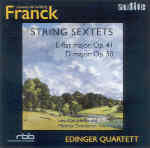The string sextet seems to have been (more or less) invented by Spohr, only to be picked up by Brahms and later Dvorák–and also Eduard Franck. I suppose that these works have a bit more Spohr in them than Brahms, and I say this not to denigrate Franck’s achievement. There’s a certain softness of rhythm to his music that just seems to be part of his makeup, but unlike Spohr he doesn’t wallow in chromatic slush. His essential lyricism never turns flabby, and his masterly use of functional counterpoint in the outer movements of both works keeps his textures aerated and the music moving purposefully forward.
Of the two pieces, I marginally prefer the D major sextet, with its more concise opening movement, but there’s very little to choose between them. Both are richly woven, beautifully finished musical tapestries, and they receive excellent performances from the Edinger Quartett (and friends). The players never push too hard or lose the basic pulse, offering excellent intonation and tonal blend. They sustain both andante second movements effortlessly, lighten their tone effectively in the scherzos, and always seem to know where the music wants to go, formally speaking. There’s really little else that need be added, save that the sound is excellent and especially well balanced so that the music never turns murky. If you fancy good, solid German romantic craftsmanship, you will enjoy these two strikingly well-made works. [3/9/2005]
































